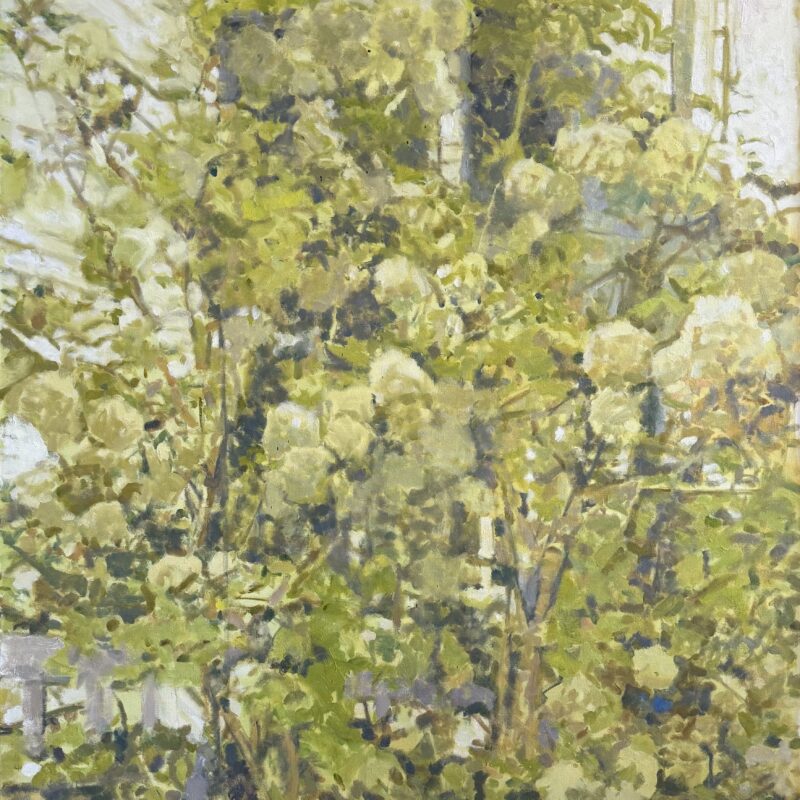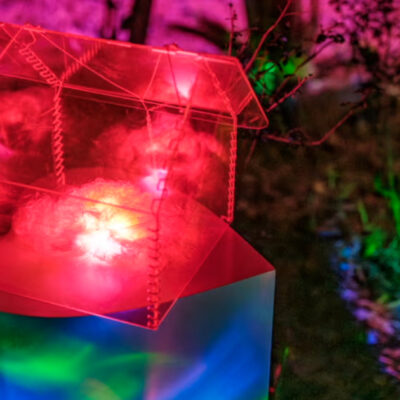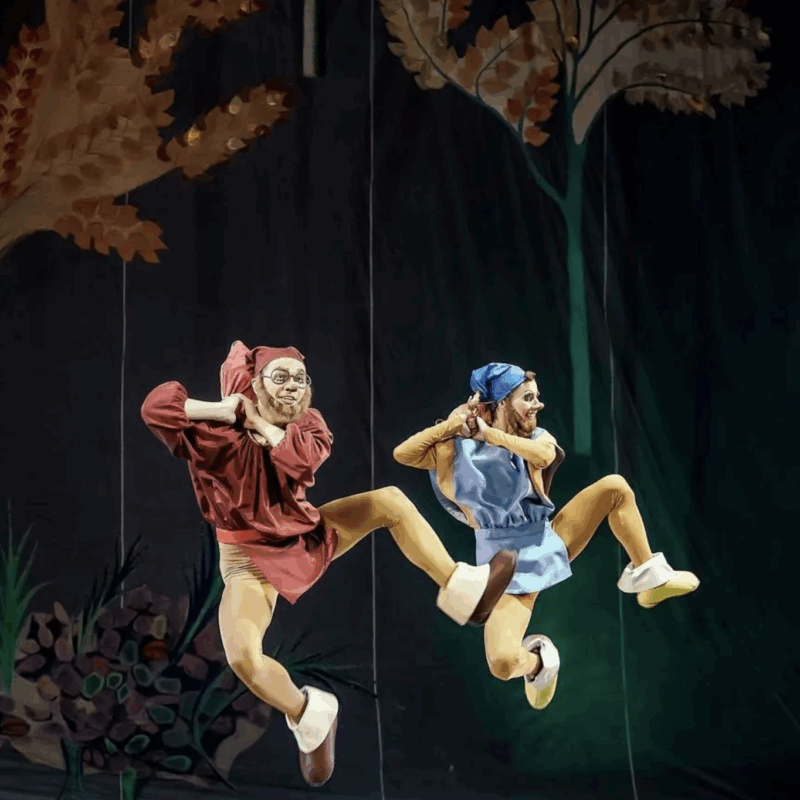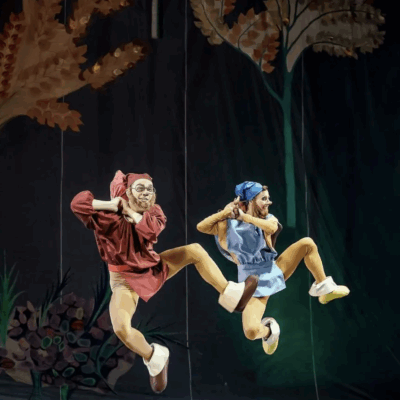
The Roches
Gravity Lounge
October 26
music Rumor has it that the Gravity Lounge will soon be closing. If that’s true, then a shadow hung over The Roches’ lovely show last Thursday night at the Downtown Mall space, the ideal venue for the intimate sounds and warm stage presence of the three-sister acoustic group.
All this was brought home after younger sister Suzzy Roche revealed that the group had never been to Charlottesville, inspiring someone in the audience to repeatedly shout, “Come back!”—until Suzzy was compelled to quip (warmly), “We haven’t gone yet.”
Such is the enthusiasm of The Roches’ fans, an ever-smaller base now that the group, who once recorded with Warner and MCA, doesn’t cut it with today’s corporate music world.
If there was anyone there Thursday night who had never heard The Roches, they were likely at first startled, then thrilled by the sisters’ unique brand of harmony. Maggie’s contralto voice hovers in the lower, bass registers—hardly a typical element in an an all-female blend of voices. Terre’s soprano soars into the upper registers. And Suzzy comes up with myriad ways to fill in the middle range. At times, their tone purposely flirts with dissonance, then expertly resolves itself, creating a drama that’s at once bracing and pleasing. The newbie also no doubt noticed that the three are fine musicians (all on guitar, and Maggie and Suzzy on piano), and that as lyricists they feel free to spill outside of genre parameters. They ended the show, for instance, with a song about the world of commuter trains (from their 1979 deubt album). It’s a sort of comic ballad—a sweet, sad paean to the human condition that seems to gather layers of convoluted psychology as it goes along and then release them with a thoughtful sigh.
Also on display was the group’s affinity for the just plain comic, such as Suzzy’s song about reading the book The 7 Habits of Highly Effective People and realizing that she is batting 0-7, and the wonderfully titled “Jesus Shaves.” And the just plain ballads were stirring, such as Terre’s “The Sound of a Tree Falling.” Yet another highlight: As if to reinforce the idea that The Roches represent folk music filtered through an uncommon level, the audience was treated to a virtuosic rendition of Handel’s “Hallelujah Chorus.”
Now that The Roches actually are gone, I can say with impunity: “Come back to Gravity—we hope—or anywhere else in town!”—Doug Nordfors

Bully
Rockstar Games
PlayStation 2
games When the cheerleader swiped the brainiac’s science essay, I snuck into the girls’ locker room to get it back. When the jocks threatened to derail Earnest’s campaign speech for class president, my trusty slingshot saved the day.
And I’m supposed to be a bully?
Um, actually not. Although, if you had listened to any of the social critics who performed a pre-emptive evisceration on Bully, the latest offering from Grand Theft Auto creators Rockstar (the game developer social critics love to hate), you’d never have known that. When Bully was announced in 2005, the Hillary Clintons and Lou Dobbs of the world immediately heard “Columbine simulator.”
Man, were they off base. In Bully, what Rockstar has created isn’t a sociopath sim, but a hilarious, razor-sharp satire of the high school jungle, where age-old cliques (jocks and geeks, preps and greasers) jostle uneasily for social supremacy and survival.
Bully drops you into the white sneakers of Jimmy Hopkins, a troubled teen who ends up at a reform school that feels like a cross between The Breakfast Club and Lord of the Flies. As it turns out, unlike GTA, there’s not a gun to be found in Bully. While there are fisticuffs and slingshots aplenty, nobody dies, nobody bleeds, and Jimmy never gets busy with the ladies, except for the occasional health-boosting kiss on Bullworth Commons—and he has to give his girlfriend a gift before she’ll even think about puckering up.
As befits a Rockstar game, you’re free to explore and do as you please, but pummeling classmates in acts of random violence gets you nowhere—other than into the clutches of the ever-present (and ever-speedy) prefects, who summarily dump you into detention. Miss class or trespass in the girl’s dorm, and they’re on you like Principal Rooney on Ferris Bueller. To complete the game’s ridiculously large menu of missions, you’ll have to use your fists, slingshot and stinkbombs—but only to defend yourself and stick up for the underdog. Jimmy’s biggest task, it turns out, is to stop Gary, a truly vicious psychological bully who makes Christian Slater’s character from Heathers look like Charlie Brown.
Of course, the Joe Liebermans of this world will still find bones to pick in Bully’s parade of high-school hijinks: The lockpicking, the pranks, the fact that authority figures taste the barbed end of the game’s sweetly satirical skewer. But if these sanctimonious critics have a bone to pick, it should be with their own rush to judgment: Bully’s a book they badly misjudged, and all before the cover was even printed.—Aaron R. Conklin

The Melvins
Starr Hill
October 23
music The Melvins’ recent stop in Charlottesville, according to one fan I know, means that Charlottesville is “within 15 years of calling itself a city.” Well, if this visit is any indication, we can look forward to one skillfully noise-polluted metropolis.
Confession: This same Melvins fan is the sole reason I found myself at the show. I’d never heard a single Melvins album. My pre-show research consisted of asking The Fan, “What’s so great about the Melvins?”
Fan: “They arguably pioneered the super-slow, sludgy, low-tuned rock (very Sabbathy, but slower and lower). They’re not afraid to have a 20-minute piece that’s nothing but super-slowed beating on drums. They’re not afraid to do Kiss-style rock one album and then sheer noise (or near silence) for an entire album.” The Fan also offered an anecdote involving singer/guitarist Buzz Osborne’s “watering the crowd” with drool when they opened for Primus back in ’93. Noise and stoner rock—and, of course, metal—were the Melvins’ main ingredients, said The Fan. And hey, I like Kyuss and John Cage, if not drool in particular. So off we went.
The crowd that filled Starr Hill was a strange mismatch for the hardwood-hippie venue. There was a preponderance of hoodies, Chuck Taylors and the color black. There was a (very faint) undercurrent of danger. It became less faint when, as opening band Big Business’ set morphed seamlessly into the Melvins’ (they share two members), I found myself on the fringe of a half-assed mosh pit incited by some drunk smelly guy.
Meanwhile, the Melvins themselves, wearing shapeless black garments and nodding under fernlike mops of kinky hair (graying, in Buzz’s case), spent an hour or so nosing around inside a dark pocket of frank, open-mouthed screaming, drum duets and tight stoner riffs. Despite their pasty shins, of which I had an unobstructed view, they’re true professionals: The wall of sound, through all its judicious pauses and rhythmic shifts and parallel drum parts, was tightly orchestrated and delivered with the confidence of an F-16.
Though my head-bobbing was sincere, as a ne
ophyte I was, in the end, unable to distinguish one province of this deep dark groove from another. I’m sure more familiarity with the Melvins’ legendary discography would have helped. Accordingly, I leave the last word to The Fan: “The Melvins were fucking great. It never stopped; there were no breaks between songs. Just drums. Two drummers pounding your face in.”—Erika Howsare





